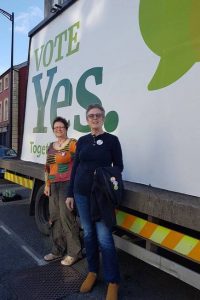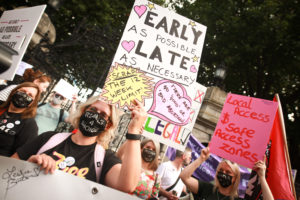
In anticipation of the March for Choice on September 28th, we are inviting our supporters to share what this year’s march means to them as part of our ‘Why I’m Marching’ blog series. Today’s post comes from Helen Stonehouse, who is a member of the ARC policy and advocacy working group.
If you would like to share why you’re marching, we would love to hear from you. Please send your written contributions (up to 700 words) or video entries (up to 1 minute, incl. captions) to media@abortionrights.ie, alongside a short introduction and picture of yourself, if you so choose. #ARCMarch19 #NoOneLeftBehind
Last year I marched while pregnant, this year I’ll march with my daughter.
Last year’s March for Choice was a strange one for me. The march itself was wonderful – I was volunteering as a steward and got to lead chants while walking alongside the crowd. I love the chance to berate the government with a megaphone. But it was also an exhausting day for me, as I was nine weeks pregnant. Early pregnancy is a crazy mix of tiredness, gnawing hunger and constant nausea – with a heady dose of emotions thrown in. I was so happy to be pregnant, but worried too – wanted pregnancies don’t always have happy endings. Societal norms dictate that we don’t share pregnancy news until 12 weeks (“just in case”), but hiding pregnancy, miscarriage or abortion just adds to the stigma around discussing women’s bodies and reproductive health.
Myself and my partner had waited until after the 8th was repealed to start our family, and we had been excited to tell close family and friends in the previous days and weeks. I knew that however my pregnancy went, I wanted those closest to us to know, so we would be supported no matter what. Marching alongside my referendum colleagues on that September day was an amazing celebration, yet I was completely worn out by the end.
In retrospect, I maybe should have pulled out of stewarding, but I don’t regret a moment of it. I was constantly hungry, and the smell of most foods made me feel queasy. But I did it, powered by Haribo, tea, joy and anger; joy for the huge change that had happened, and anger for everyone who’d been failed by our laws, too many of whom can’t be with us today. I knew that there were still people in 2018 facing a pregnancy they couldn’t continue, and they’d still have to travel or import pills. But I was hopeful that repealing the 8th would be a new day for reproductive rights in Ireland, and that no one else would have to make those decisions.
I watched as the post-repeal abortion legislation was debated, nausea fading and my belly growing bigger. I must admit, I was cynical from the start; I have never trusted politicians, and sadly, I was right. Legislation is one key piece of free, safe, legal, local access to abortion and our legislation isn’t good enough. Three day waiting periods, criminalisation of doctors, conscientious objection – the legislation is riddled with paternalistic and stigmatising barriers. Still, it was a start. As 2019 rolled in, abortion services were rolled out and we saw the impact of those barriers in reality – couples still travelling after receiving a devastating prenatal diagnosis, whole hospitals refusing to provide, anti-choice protesters outside GP surgeries, high costs for anyone without a PPSN, no free provision for our Northern siblings. With every passing day, my wriggling little parasite’s kicks grew stronger and every day I was grateful she was still in there, growing healthy and strong. Pregnancy is hard work – physically, emotionally and mentally draining, even without complications. I don’t think I understood so viscerally how important abortion was until I was pregnant. I was incredibly happy to be pregnant, but I would never force someone to remain pregnant against their will. And ultimately, that’s what being pro-choice means.
So why am I marching this year? Well, I’m looking forward to marching without feeling like throwing up. And I am beyond excited to bring my daughter to her first march at the grand old age of five months. I’ll be celebrating everything we’ve achieved in making Ireland a better place, particularly for my daughter’s generation. But just like last year, there are people across Ireland facing pregnancies they can’t continue, and our laws will fail them. I will not stop marching until free, safe, legal abortion is a reality across this island. This year I march for myself, for my daughter, and for everyone still awaiting reproductive justice.

















